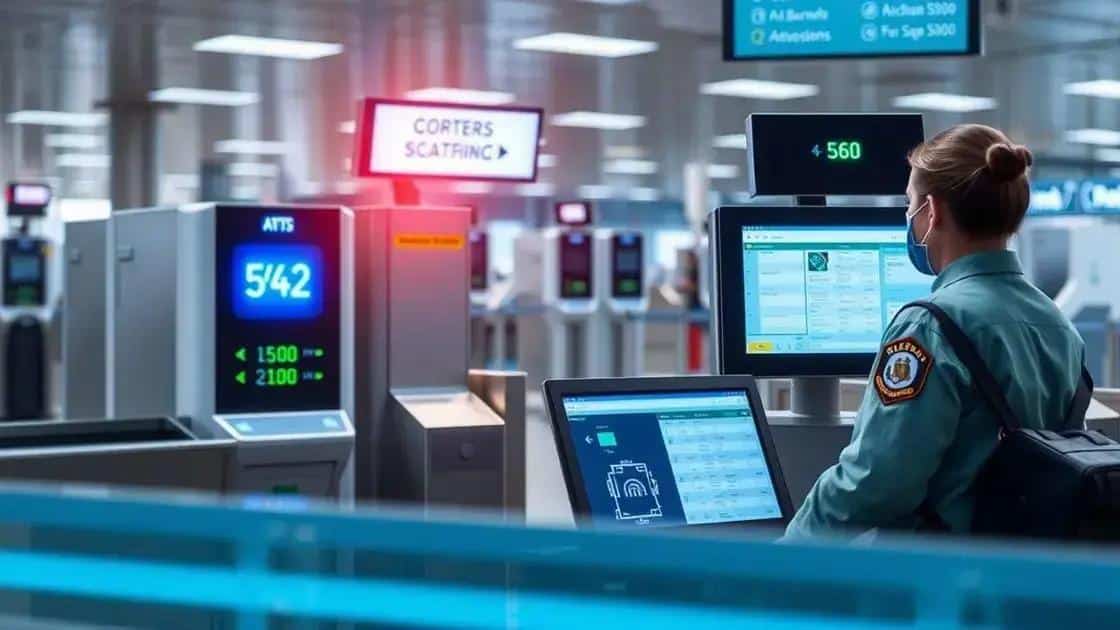Border security law amendments: what you need to know

Border security law amendments have introduced stricter customs regulations, enhanced screening procedures, and updated visa requirements, significantly impacting travels and business operations across borders.
Border security law amendments are making waves with changes that could affect many. Have you considered how these new regulations impact you and your travel plans? Let’s dive in.
Understanding the current border security laws
Understanding the current border security laws is vital for anyone involved in travel, trade, or border management. These laws are designed to protect the nation’s borders while facilitating legitimate movement. They dictate how individuals and goods cross borders, establishing guidelines and requirements that must be met.
The Importance of Knowing the Laws
As the landscape of border security evolves, so do the laws that govern it. Familiarity with these laws helps avoid legal issues and ensures smooth transit for travelers. Compliance with border security regulations is essential, especially for businesses relying on international trade.
Key Aspects of Current Laws
Current border security laws include several critical components:
- Customs Regulations: These regulations outline how goods must be declared when entering or leaving the country.
- Immigration Policies: They specify requirements for visa applications, entry permits, and traveler verification.
- Security Measures: These include guidelines for screening passengers and cargo to prevent illegal activities.
Another aspect is the increasing use of technology in monitoring and enforcement. This includes advanced biometric systems and surveillance methods that enhance security while facilitating legitimate crossings. Understanding these technologies allows travelers to navigate checkpoints more effectively.
Compliance is not just about following laws; it’s also about safety. Many laws are enacted to prevent illegal immigration and trafficking, protecting both the public and foreign nationals. When individuals and businesses understand the significance of these laws, they contribute to a safer environment.
Changing Environments
Border security laws can change rapidly due to global events or shifts in political climate. Regular updates and reviews by government agencies often address emerging threats or technological advancements. Staying informed about these changes allows travelers to adapt their approaches and maintain compliance with border security law amendments.
In summary, grasping the current border security laws is essential for anyone affected by international movement. With effective understanding and compliance, the path across borders can be navigated smoothly, enhancing both security and accessibility.
Key changes in the recent amendments

The key changes in the recent amendments to border security laws reflect the evolving landscape of national security and immigration. As governments adapt to new challenges, understanding these changes is crucial for both individuals and businesses affecting cross-border movement.
Significant Adjustments in Regulations
One significant amendment includes stricter customs enforcement. This change emphasizes the need for accurate declaration of goods, with increased penalties for non-compliance. It is now more important than ever to be aware of what must be declared when crossing borders.
- Enhanced Screening Procedures: New technologies are being implemented for more thorough inspections of passengers and cargo.
- Digital Entry Systems: Many countries are adopting digital systems to streamline the entry process, making it essential for travelers to stay updated.
- Stricter Visa Requirements: Visa application processes are becoming more rigorous, requiring detailed documentation to ensure eligibility.
Another aspect of these amendments is the focus on data security. With the rise of digital transactions and personal data collection at borders, regulations are being updated to protect privacy while maintaining security. This shift means travelers should be prepared for new questions regarding their data and privacy as they approach borders.
The amendments also address humanitarian considerations. As migration patterns shift due to crises, regulations are adapting to provide protections for asylum seekers and vulnerable populations. Understanding these amendments allows travelers to navigate the complexities of immigration law more effectively.
Implementation of New Technologies
With the implementation of technologies like biometric verification, the process of identity checking is transforming. This technology enhances security but raises questions about privacy rights and the management of personal data. Therefore, individuals crossing borders should inform themselves on how these systems work.
Moreover, businesses must adapt to these changes as well. Supply chains can be impacted by new regulations, leading to potential delays. It’s advisable for companies to stay proactive and ensure compliance with the most recent laws to avoid disruptions.
Staying informed about the key changes in the recent amendments is critical for anyone involved in travel or trade. Understanding these aspects not only aids in compliance but also enhances overall safety and efficiency at borders.
Implications for travelers and businesses
The implications for travelers and businesses due to recent border security law amendments are significant and multifaceted. As these laws evolve, they directly affect how individuals and companies operate across borders, shaping travel experiences and trade practices.
Impact on Travelers
Travelers face new requirements when crossing borders. With stricter regulations, it is crucial to have all necessary documents ready. Passport checks might become more comprehensive, adding to wait times at checkpoints. Additionally, knowing what items need to be declared is essential to avoid fines.
- Compliant Visa Applications: Travelers must ensure their visa applications meet stricter guidelines.
- Increased Wait Times: Enhanced security measures can lead to longer processing times at borders.
- Awareness of Customs Laws: Familiarity with customs laws helps avoid delays and potential legal issues.
Furthermore, technology adoption at borders means travelers may encounter new systems for document verification and data collection. This can lead to a more efficient process, but it also requires understanding how personal data is handled during travel.
Business Considerations
For businesses, understanding these amendments is key to maintaining smooth operations. Compliance with new import and export regulations can prevent costly delays. Companies need to revise their logistics strategies to align with border security laws.
Many businesses engaging in international trade now face challenges such as:
- Adjusting Supply Chains: New procedures may require companies to alter their supply chain logistics.
- Regulatory Compliance Costs: Meeting new standards can lead to increased operational costs.
- Risk of Penalties: Non-compliance can result in fines, which businesses must proactively plan for.
Additionally, companies that regularly transport goods across borders must invest in training for their employees. Understanding the current border security laws ensures that staff can effectively manage compliance and respond swiftly to any changes.
Overall, adapting to the new landscape requires both travelers and businesses to stay informed and flexible. By understanding the implications for travelers and businesses, they can navigate the complexities of border crossing more effectively.
How to stay compliant with the new regulations

Understanding how to stay compliant with the new regulations is crucial for both individuals and businesses affected by border security law amendments. Being informed and prepared will help avoid issues that may arise due to non-compliance.
Key Steps for Compliance
One of the first steps is to regularly review the latest updates on border security laws. As regulations change, being proactive ensures that you remain ahead of any compliance requirements.
- Stay Informed: Subscribe to government newsletters or updates from official sources regarding border security.
- Documentation: Ensure that all travel documents, such as visas and passports, are current and meet the new standards.
- Training: For businesses, conduct regular training sessions for employees on legal obligations.
Another vital aspect involves the adoption of new technologies for compliance. Using software that tracks changing regulations can streamline the process of staying compliant.
Engage with Professionals
Working with legal or compliance experts can provide valuable insights into how to navigate complex regulations. This is especially important for businesses that handle large volumes of cross-border transactions.
Additionally, consider forming partnerships with logistics companies that understand the regulations. They often provide support in ensuring compliance related to shipping and customs processes.
It’s important to remember that compliance isn’t just about following laws; it also involves understanding the implications of non-compliance. Penalties can include fines or delays in shipping, which can impact your business adversely.
Utilize Resources
Many tools and resources are available to help individuals and businesses stay compliant. Online training modules, government workshops, and industry seminars can equip you with the necessary knowledge.
Moreover, staying organized and maintaining clear records of compliance efforts is essential. This includes keeping documents related to shipments and customs interactions in an easily accessible format.
By actively engaging in these practices, you can effectively navigate how to stay compliant with the new regulations, ensuring that travel or trade occurs smoothly and without interruption.
In conclusion, understanding the recent changes in border security laws is essential for travelers and businesses alike. As these regulations evolve, staying informed ensures compliance and smooth operations. Embracing new technologies, engaging with professionals, and utilizing available resources can help navigate these complexities. By preparing for these changes, individuals and businesses can continue to travel and trade effectively, minimizing disruptions and enhancing security. Remember, knowledge is power when it comes to border regulations!
FAQ – Frequently Asked Questions about Border Security Law Amendments
What are the recent changes in border security laws?
Recent changes include stricter customs enforcement, enhanced screening procedures, and updated visa requirements for travelers.
How can travelers prepare for border security law amendments?
Travelers should ensure their documents are updated, be aware of customs regulations, and anticipate longer wait times at checkpoints.
What should businesses do to comply with new regulations?
Businesses should stay informed about regulatory changes, conduct employee training, and maintain clear records of compliance efforts.
How can technology help with compliance?
Technology can assist businesses in tracking regulatory changes and streamlining documentation processes, enhancing efficiency and compliance.





